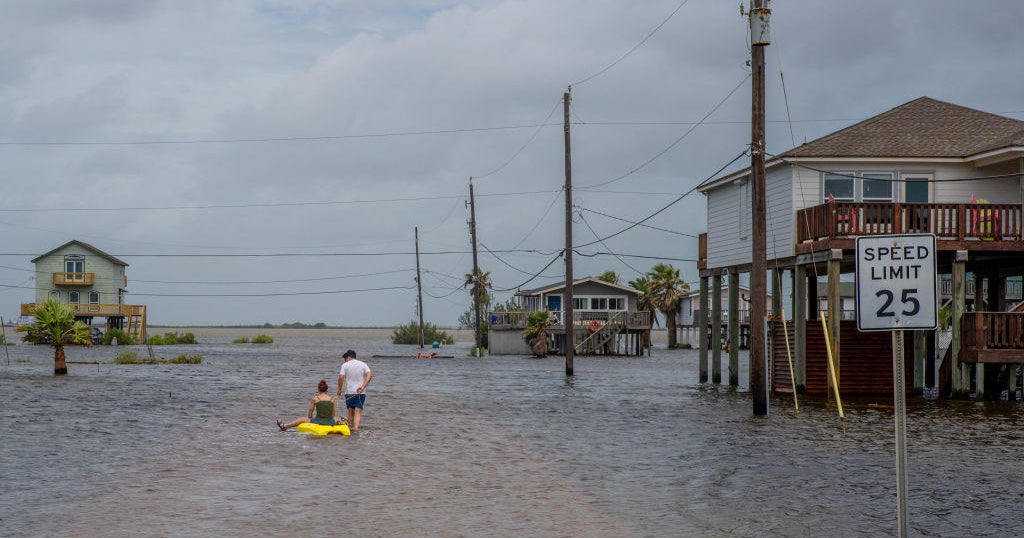AlbertoFirstly Named a tropical storm After downgrading to a tropical depression in the Atlantic hurricane season, the National Hurricane Center in Miami announced Thursday evening, but not before the storm dumped heavy rain and caused widespread flooding in parts of Mexico and Texas.
At least three deaths have been blamed on the storm that made landfall in Mexico earlier Thursday. Although the storm had dissipated as of 5 p.m. Thursday, Alberto continued to bring heavy rain and flash flooding to northeastern Mexico. Hurricane Center reported.
Parts of northeastern Mexico could receive another 5 to 10 inches of rain, with up to 20 inches over much of the Mexican states of Coahuila, Nuevo Leon, and Tamaulipas.
Across South Texas, rain will continue to taper off Thursday night, the hurricane center predicts, with totals of an inch or less.. All tropical storm warnings associated with Alberto have been discontinued.
Brandon Bell/Getty Images
Alberto was centered Thursday evening about 260 miles west of Tampico, Mexico, and 380 miles southwest of Brownsville, Texas. It had maximum sustained winds of 30 miles per hour, the highest sustained gust of 50 miles per hour since earlier Thursday. The storm is moving west at 24 mph.
After it immediately moved ashore in Tampico, it was initially disappointing to see little rain. It was raining sporadically early in the morning and the sun even broke through at times.
“We were hoping the water would come because we needed it here, but as far as I can tell it went somewhere else,” said Tampico resident Marta Alicia Hernandez.
But inland in the neighboring states of Nuevo León and Veracruz, heavy rains caused damage.
There, civil defense officials reported three deaths related to Alberto’s rains. They said one person died in the La Silla River in the state capital city of Monterrey and two minors were electrocuted in the municipality of Allende. Local media reported that the boys were riding a bicycle in the rain.
Water also washed away part of a major highway connecting Monterey and Saltillo.
Nuevo Leon Governor Samuel García wrote on his account on his social media platform X that metro and public transport services will be suspended in Monterrey from Wednesday night to Thursday afternoon until Alberto passes.
In the south of Veracruz province, 24 families were left homeless in the state capital, Salaba, after days of heavy rains caused a retaining wall to collapse on three buildings.
At dawn, residents heard a deafening noise and the ground began to move.
“I thought it was an earthquake,” said Pedro Luna Sanchez, who has owned an apartment in the building for 26 years. “I looked out the window and saw my neighbor calling for help. I looked even closer and saw the wall on top of the building.”
All occupants escaped safely.
Alberto triggered tropical storm warnings covering most of the western Gulf of Mexico coast from Texas to Veracruz. The storm had maximum sustained winds of 45 mph.
Schools across the state of Tamaulipas were closed until Alberto made landfall Friday. Shelters across the state were prepared to receive residents trying to escape the high water.
The U.S. National Weather Service said the main danger from heavy rain is flash flooding for the southern Texas coast. Areas along the Texas coast saw some road flooding and dangerous rip currents on Wednesday, as well as coastal flooding.
The mayor of Corpus Christi, Texas, plans to request a disaster declaration after 6 inches of rain drenched parts of the city on Wednesday, a spokesman said. Residents reported water and wind damage and damaged canals on the north side of Padre Island Thursday, Brianna Sandoval said.
Two people were rescued from parked vehicles on flooded roads, and a downed power pole diverted highway traffic for part of the morning. The city was under constant flood alert.
Bert Dagnon, who closed his saltwater gift shop in Galveston out of an abundance of caution on Wednesday, said the rain had not fallen as much as predicted and had little impact on the area other than flooding in low-lying areas.
“I suspect everyone will pick up, mop up and move on,” he said Thursday, adding that he already had customers at the beach as the sky turned somewhat sunny.
In Surfside Beach, a Texas city on a barrier island, storm surge early Thursday left some damaged roads and lots of debris, but mostly “very little damage” to tall structures, Mayor Greg Pizzo said.
Good pictures
As the surge subsides in the late morning, “you can almost get around now,” he said. Pizzo Island has about 800 full-time residents, with 10,000 vacationers in the summer.
Tampico resident Octavio González was disappointed with the little rain from Alberto.
Very little water fell. “We’re very dry in the southern part of Tamaulipas. The truth is, we have a lot of hope for rain.”
